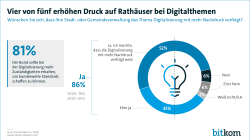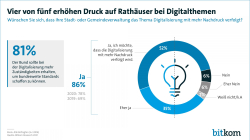Germans demand quicker action regarding digitisation at the local level
- A majority finds their city or local government backwards in digital matters
- Four out of five citizens want to use local services online
- Two thirds of respondents expect timely OZG implementation to fail
- Two-day Smart Country Convention starts today
Berlin, 26th October 2021 – From efficient administration to intelligent mobility: For most Germans, the digital transformation at the local level is advancing too slowly. Four out of five (86 percent) are calling on their city councils to pursue the digital transformation with greater vigour. In 2020, only 78 percent called for more committed and quicker action regarding the digitisation of their city or local government; in 2019, it was 69 percent. Three out of five respondents (69 percent) went as far as calling their local government backwards in digital matters. Only about one third (36 percent) saw the level of digitisation of their commune as advanced. These are the results of a representative survey of more than 1,000 people aged 18 and above, commissioned by Germany’s digital industry association, Bitkom.
One way to make progress with the digitisation of municipalities and communes was to expand competencies at the federal level. Four out of five respondents (81 percent) say the federal government should be given more power to establish nationwide standards. “Citizens are urging cities and local governments to offer more digital services. Town halls must meet this demand more comprehensively,” says Bitkom’s chief managing director, Dr. Bernd Rohleder. “The federal government must take on more responsibility for the digital transformation and should be more capable to act, to set standards, and be allowed to give support. Local governments require money, know-how, and a close exchange with citizens and businesses.”
The Smart Country Convention provides a platform for this exchange. A 100 percent digital event, it will take place on 26 and 27 October 2021, bringing together conference and networking on subjects such as e-government and smart cities. Jens Heithecker, executive vice president of Messe Berlin, explains: “The digital transformation of public agencies is one of the most important tasks of our time – this has been strikingly shown by the coronavirus pandemic. But long before the pandemic highlighted the deficits and unused potential of digitisation, it had been an issue of burning interest. The Smart Country Convention was launched in 2018 with the aim of accelerating the digitisation of the public sector and established itself as a gathering place for the public sector right off the bat. What’s special about the Smart Country Convention is that it spans many industries: whether it’s e-government or smart cities – our aspiration is to cover these issues along the entire value creation chain and to bring all the players together. We don’t just talk about digitisation. We use concrete examples to show how it can be done.”
Four out of five citizens want to use local services online
The way citizens see it, consistently digitising overburdened local governments would constitute a big step forward for the digital transformation at the federal, state, and the local level. A vast majority of Germans wants digitised local governments. Four out of five (80 percent) would like to take care of administrative matters online. For 88 percent, things could be even simpler: They believe that applying for, renewing, and transmitting documents should be done automatically.
Three quarters (76 percent) would use an electronic version of their personal identity card at an online register office. A similar amount (75 percent) is in favour of a single service account that makes possible identification, authentication, and access to digital public services. Every second respondent (58 percent) is prepared to store their master data with the public authorities and allow them to exchange and reuse them. Rohleder: “Innovative digital public services are an international location factor. It is hard to imagine that the most innovative and promising business models in the coming years will be created in countries that struggle to keep pace with the digitisation of their public sector.”
Digital services for families and children are especially popular – from registering births to apprenticeships. Every second respondent (56 percent) would like to apply for family services online, and a similar amount (55 percent) would do so with birth certificates. Moreover, 95 percent would be in favour of a central application portal for nurseries and schools, and automatic suggestions for nursery places, respectively. In schools, 98 percent call for good IT equipment and 88 percent for a local “digital focus programme” in the place where they live.
Two thirds of respondents expect timely OZG implementation to fail
By the end of 2022, all 575 public services should be available online according to the Online Access Act (Onlinezugangsgesetz, OZG). Of those, 314 are pending, 115 are in the planning phase, and 199 in the implementation phase. Nationwide, 73 public services are now available to citizens online. According to almost two thirds of Germans (64 percent), full and timely implementation of all services is doomed to fail; only a third (33 percent) believes the programme will be successful. “Implementing the Online Access Act is one of the most important steps towards a digital government,” says Rohleder. “Even if the implementation date 2022 is wobbly: We must think ahead. In addition to the OZG, we need a Future Administration Act. We can only exploit the full potential of digital public services if all the administration’s internal procedures and processes are also digitised across the board.” This includes creating more transparency regarding administrative procedures: being able to track the progress of an application online, for example. This would be welcomed by 87 percent of respondents. Only about one third (38 percent) agree with the statement that they receive quick and competent information from public authorities.
Many want disaster alerts via smartphone
Digital security concepts are also attracting a lot of interest. Almost all respondents (96 percent) want disaster alerts from government authorities on their smartphones, for example, severe weather conditions. Many are also open to the digitisation of community safety: 86 percent are in favour of the use of bodycams for the fire brigade and 82 percent for the police. Four out of five respondents (79 percent) approve of video surveillance in public areas in accordance with data privacy regulation. Three quarters of respondents (75 percent) would welcome more online police stations and seven out of ten (70 percent) are for the use of drones to police major events. 68 percent are in favour of systematically analysing social media accounts to investigate and prosecute crimes. More than every second respondent (59 percent) is in favour of introducing voluntary citizen reporting systems to upload video footage or information that contribute to searching for suspects.
Town and country – and opportunities: Digitisation as a problem solver
Town and country are faced with great challenges – challenges that digitisation can help them with. Almost nine out of ten respondents (88 percent) agree with the statement that city and local governments must expedite digitisation to not be left behind. 79 percent are sure that digitisation helps to create more equal living conditions in town and country.
City dwellers see the biggest chances in improving educational offerings for children (78 percent), new mobility and transportation concepts (76 percent), and public safety (70 percent). Almost two thirds feel that digitisation would unburden public service providers (63 percent) and the environment (62 percent).
In rural areas, four out of five respondents (81 percent) hope for digitisation to create better educational offerings for children. Other benefits named by the respondents include increased attractiveness of rural areas as places to live and work (79 percent) and for companies to do business (71 percent). Two thirds (66 percent) expect that it would take the strain off communal public services. And 63 percent assume that the digital transformation will improve medical care in rural areas. Rohleder: “Digital solutions overcome great distances: in medical care, in education, in public services, in the workplace. Nowhere are the distances greater than in rural areas. Digitisation is the tool of choice here.”
Methodology note: The basis of these data is a survey conducted by Bitkom Research and commissioned by Germany’s digital industry association, Bitkom. It included telephone surveys of 1,006 people aged 18 and above in August 2021. The survey is representative of the population.


